外研版(2019)必修第二册Unit 6 Earth first Using language课件(共43张PPT)
文档属性
| 名称 | 外研版(2019)必修第二册Unit 6 Earth first Using language课件(共43张PPT) |  | |
| 格式 | zip | ||
| 文件大小 | 2.0MB | ||
| 资源类型 | 教案 | ||
| 版本资源 | 外研版(2019) | ||
| 科目 | 英语 | ||
| 更新时间 | 2022-07-11 16:05:10 | ||
图片预览


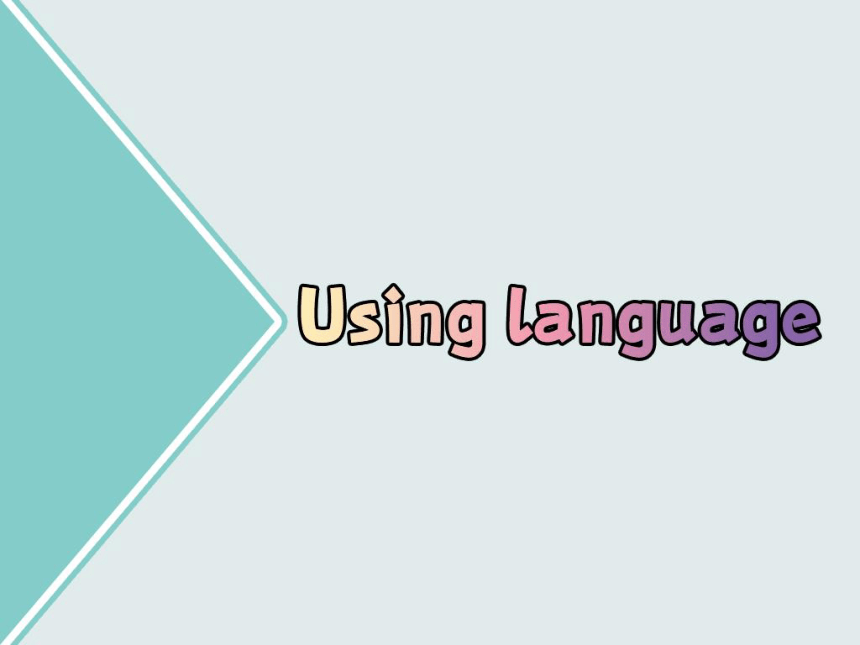
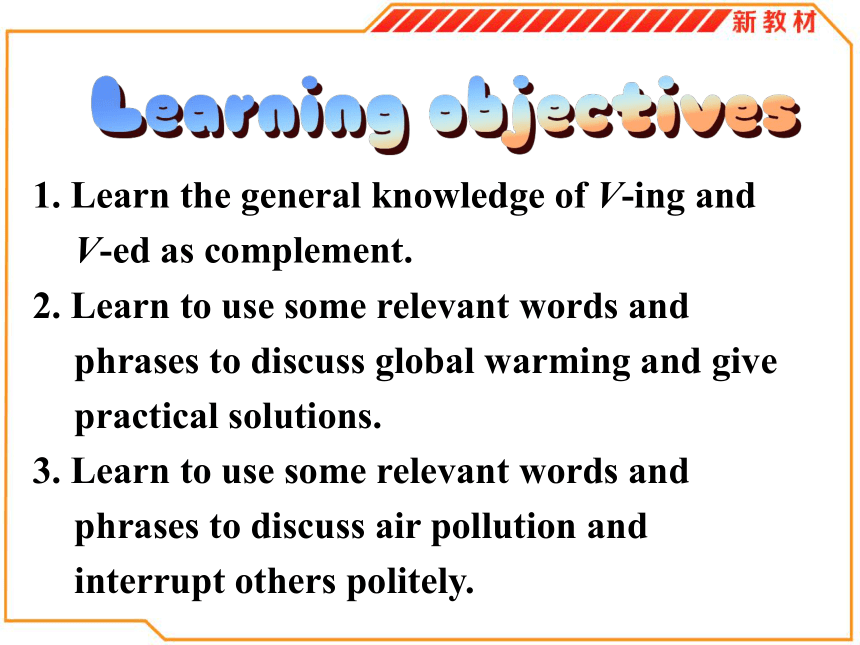

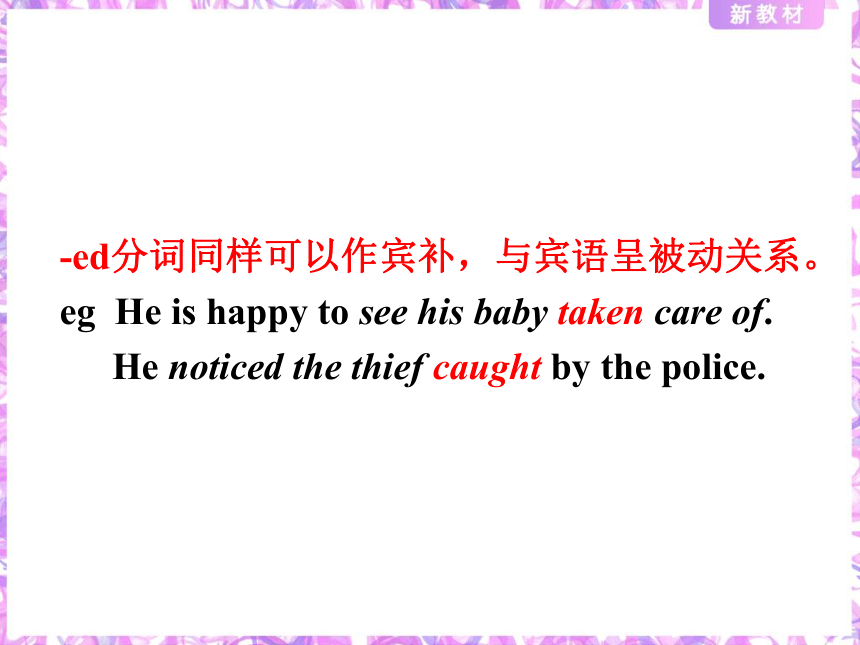
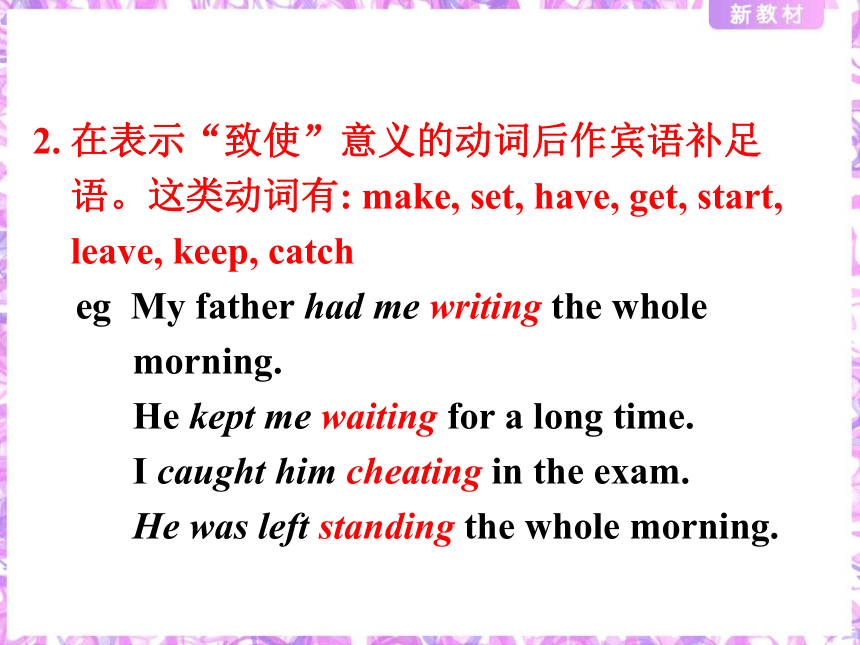
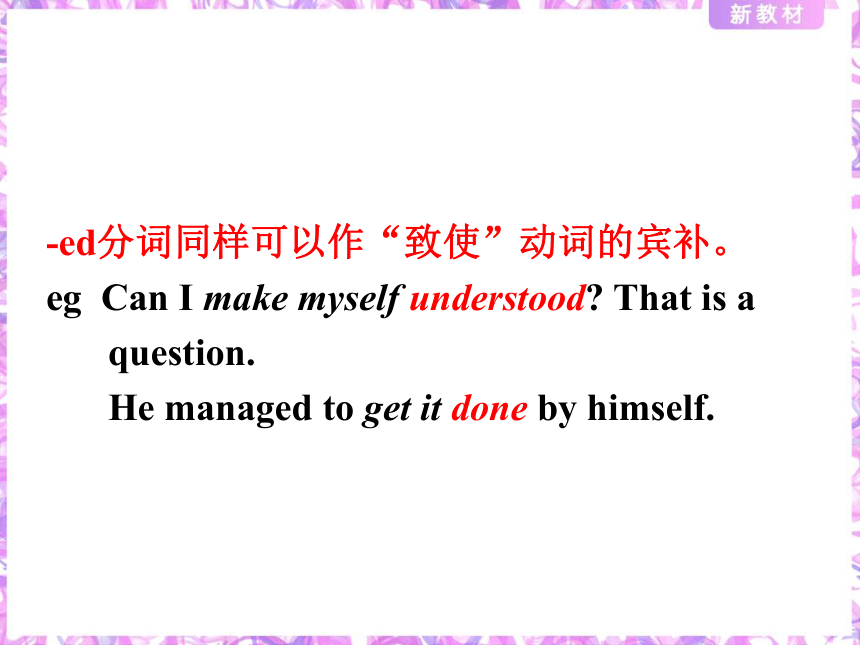
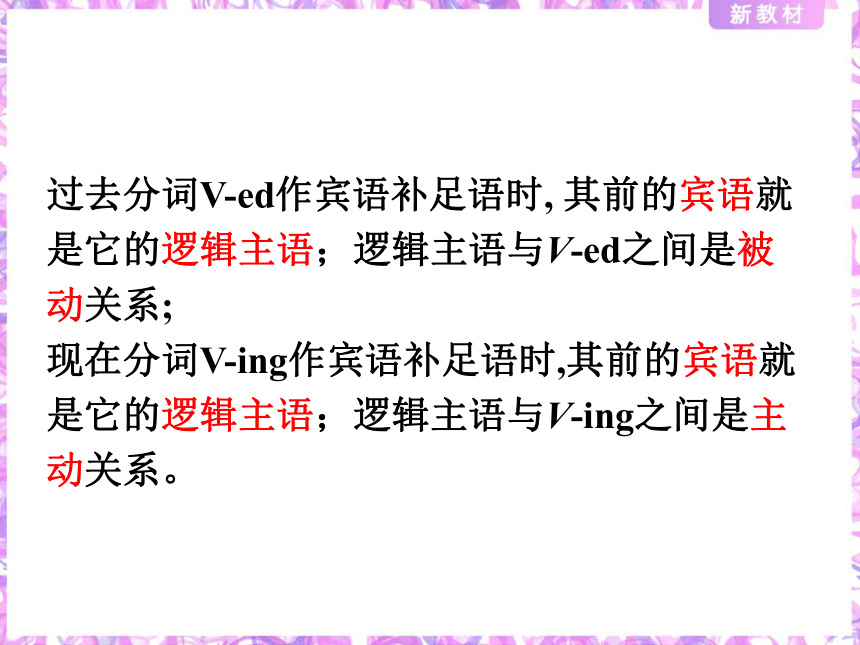
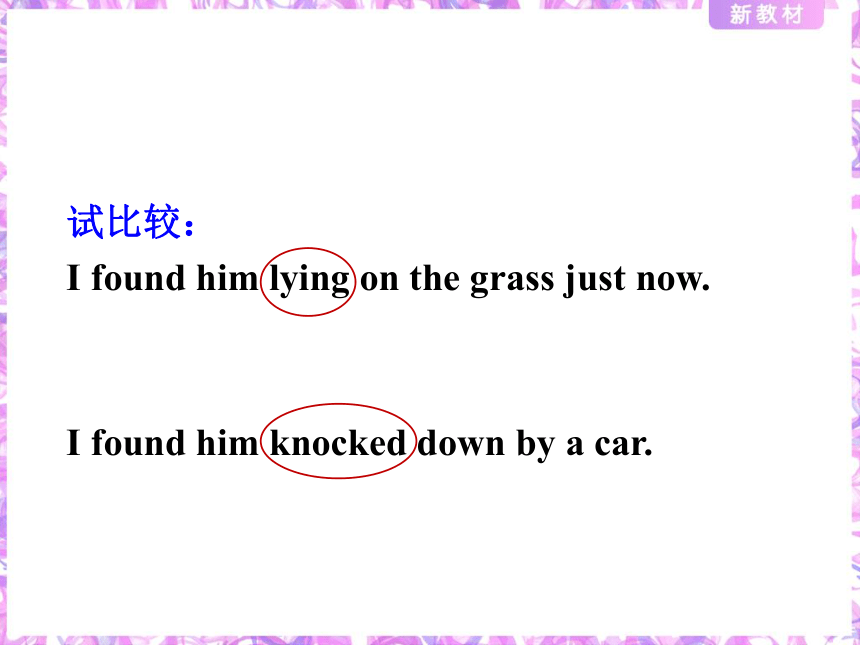
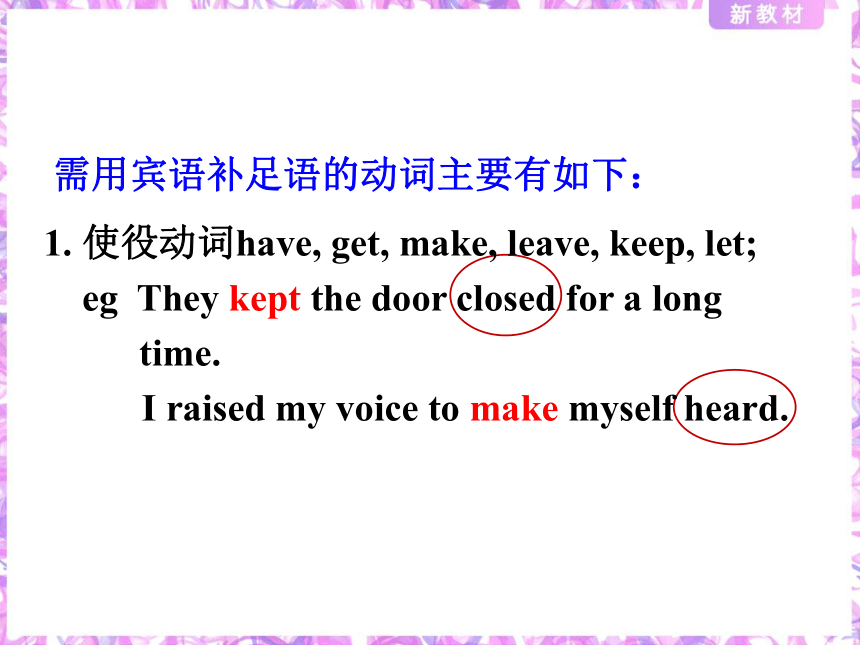
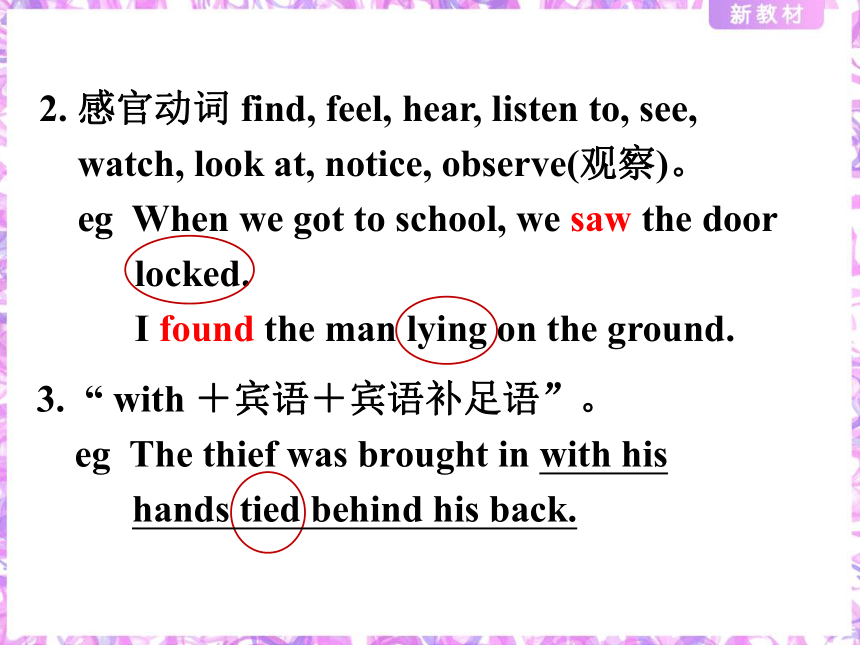
文档简介
(共43张PPT)
Unit 6
Unit 6 Earth first
1. Learn the general knowledge of V-ing and V-ed as complement.
2. Learn to use some relevant words and phrases to discuss global warming and give practical solutions.
3. Learn to use some relevant words and phrases to discuss air pollution and interrupt others politely.
1. 在感觉/感官动词后作宾语补足语,表示
宾语的行为正在进行,呈主动关系。
这类动词有:feel, see, notice, watch, hear,
smell, listen to, look at, find
eg I felt my heart beating faster.
She smelt something burning.
Listen to the birds singing outside.
现在分词和过去分词作补语
-ed分词同样可以作宾补,与宾语呈被动关系。
eg He is happy to see his baby taken care of.
He noticed the thief caught by the police.
2. 在表示“致使”意义的动词后作宾语补足
语。这类动词有: make, set, have, get, start,
leave, keep, catch
eg My father had me writing the whole
morning.
He kept me waiting for a long time.
I caught him cheating in the exam.
He was left standing the whole morning.
-ed分词同样可以作“致使”动词的宾补。
eg Can I make myself understood That is a
question.
He managed to get it done by himself.
过去分词V-ed作宾语补足语时, 其前的宾语就是它的逻辑主语;逻辑主语与V-ed之间是被动关系;
现在分词V-ing作宾语补足语时,其前的宾语就是它的逻辑主语;逻辑主语与V-ing之间是主动关系。
试比较:
I found him lying on the grass just now.
I found him knocked down by a car.
需用宾语补足语的动词主要有如下:
1. 使役动词have, get, make, leave, keep, let;
eg They kept the door closed for a long
time.
I raised my voice to make myself heard.
2. 感官动词 find, feel, hear, listen to, see,
watch, look at, notice, observe(观察)。
eg When we got to school, we saw the door
locked.
I found the man lying on the ground.
3. “ with +宾语+宾语补足语”。
eg The thief was brought in with his
hands tied behind his back.
4. 表示“意欲; 命令”的动词want, wish, like,
expect, order等
eg He wants to have his eyes examined
tomorrow.
The father wants his daughter
to learn the piano.
We all enjoy listening to music.
我看见他正在上楼。
I saw him going upstairs.
(宾语)
(宾语补足语)
我们所有的人都喜欢听音乐。
We watched her crossing the street.
V-ing作宾语补足语
V-ing作宾补表主动或动作正在进行
我们看着她走过大街。
(宾语补足语)
常见的能接V-ing作宾语补足语的动词:
1. (感观动词) see /observe /notice /watch
/hear/smell/listen to/look at/feel/find
sb/ sth doing
eg They heard him singing in the next
room.
He was heard singing in the next room.
2. 使役动词keep, leave, have, get等常接V-ing形式作宾语补足语,表示一个持续进行的动作。
eg The manager kept me waiting the
whole morning.
Don’t leave the water running while you
brush your teeth.
1. I heard someone ___________(knock) at the
door when I was watching TV.
2. Have you heard someone _______(knock) at
the door
knocking
knock
Fill in blanks.
3. She feels herself _________(get) younger
and younger.
4. I usually have my hair ________(cut) once a
month.
5. he found his hometown _________ (change).
getting
cut
changed
8. She couldn’t get her car _________(start).
9. Do you see a girl _________(dress) in red
10. We watched the plane _______(take) off at the airport.
starting
dressed
take
二、动词填空
1. I fell down and broke three of my teeth. I
wonder how many times I have to come here
and get my false teeth _____ (fix).
2. You must get the work ______ (do) before
Friday.
fixed
done
3. We are pleased to see the problem ______
(settle) so quickly.
4. There was so much noise in the room that the
speaker couldn’t make himself ______ (hear).
5. With the money ____ (lose), he couldn’t buy
any ticket.
lost
settled
heard
6. With winter _______ (come) on, it’s time to
buy warm clothes.
7. I’ve never heard the word ____ (use) in
spoken English.
8. The foreigner tried his best, but he still
couldn’t make his point _________
(understand).
understood
coming
used
9. When I came in, I saw Dr. Li _________
(examine) a patient.
10. As a teacher, you shouldn’t have your
students _____(read) such a book.
read
examining
Look at the sentences from the reading passage and answer the questions.
a We see a woman swimming at night in a
dark sea.
b It made people frightened of sharks, …
In sentence (a), who is swimming at night
2. In sentence (b), who is frightened of sharks.
In sentence (a), a woman is swimming at
night.
In sentence (b), people are frightened of
sharks.
In sentence (a), a woman is swimming. In
other words, the woman does the action of swimming. So the author uses -ing. But in sentence (b), people are frightened. As a result, passive voice is used. So the author uses -ed.
3. Why does the author choose to use different
forms of verbs in the two sentences
Read the passage and choose the correct form of the verbs.
n. 海洋,大海
v. 致力,献身,倾注
Attracted/ Attracting by mermaids since she
was a child, Hannah Fraser created her first tail when she was only nine years old. Now, she
is a model and performance artist devoted/
devoting to ocean conservation. She can be
seen worn/wearing mermaid clothing and
dived/diving up to 50 feet underwater to
swim with dolphins, sharks and whales.
n. 报告,(观点的)陈述,说明
n. 打猎,狩猎
n. 残忍,残酷,残暴
v. 使……突出,使注意力集中
She appeared in The Cove, a documentary aiming at highlighting the cruelty of dolphin hunting. Besides performing and modelling, Hannah travels the world given/giving presentations and talks, getting more people involved/ involving in the conservation of ocean life.
n. 员工
n. (野生生物)保护区
Rewrite the underlined sentences in the interview, using the -ing and -ed forms to make it more compact and coherent.
Reporter: Hello from Sanjiangyuan National
Nature Reserve (SNNR). With me
today is Lin Feng, a staff member
working here. Lin Feng, can you tell
us a bit about SNNR
Lin Feng: Well, SNNR was established in
2000 and is the highest and second
largest nature reserve in China.
Here, you can see dramatic
landscapes. They change from
mountains to grasslands, forests to
rivers. Most importantly, it contains
the headwaters of the Yellow River.
The Changjiang River and the
Lancang River.
Here you can see dramatic landscapes
changing from mountains to grasslands, forests to rivers.
v. 建立,设立
n. 洪水,水灾
n. 旱灾,干旱
v. 破损,损害,损伤
Reporter: What's the biggest problem faced by
SNNR
Lin Feng: In recent years, we have seen large
areas of wetland that were damaged
by human activity. This has had a
negative impact on the unique plants
and animals living there. We’ve also
seen droughts and floods caused by
these changes, which affect the water
supply downstream.
In recent years, we have seen large areas of wetland damaged by human activity.
v. 影响
n. 煤气、电力、自来水等供应
(系统)
adj. 可持续的,不可破坏环境的
v. 使恢复
Reporter: And what sort of work are you
doing to help solve these problems
Lin Feng: Our job is to protect and restore the
natural environment. This includes
keeping the original environment
from being touched, as well as
adopting new, sustainable ways of
feeding farm animals.
This includes keeping the original environment untouched,…
v. 采取(某种方法)
Dealing with global warming
adj. (能源)可更新的,可再生的,可恢复的
Share what you know about these expressions.
water conservation
LED bulb
renewable energy
n. 灯泡
carbon footprint
greenhouse effect
reusable water bottle
n. 碳
n. 温室,暖房
adj. 可再度使用的,可多次使用的
adj. 利用太阳光(能)的
Complete the brochure with the expressions in Activity 4.
Six things you can do NOW to help stop global warming
Reduce waste by choosing reusable products-
get a(n) 1.______________________, for
example.
Try to reduce your 2. ___________________.
Walk or ride a bike instead of taking a car.
Use 3. _________________________ such as
solar energy and wind power.
reusable water bottle
carbon footprint
renewable energy
n. 小册子
v. 减少,降低
v. 释放,排放
The less energy you use, the less carbon
dioxide is released. Replacing a regular light
bulb with a(n) 4. ________________________
is a great start.
5. ________________________ is important
because clean water is a limited resource.
Also, we use a lot of energy to process clean
water.
LED bulb
Water conservation
Planting trees can help a lot in reducing
the 6. ___________________ because trees
absorb the carbon dioxide in the air.
greenhouse effect
Discuss what you can do to help deal with global warming, using the words and expressions you have learnt.
A: I will go to school by
bike to reduce my
carbon footprint.
B: I will bring a reusable
bag when I go shopping.
Possible answers:
I will turn off the taps when I find the water running.
We should turn off the lights when we leave the classroom so that we won't have them burning all night.
1. Try to review -ing and -ed as
complement and do some relevant
exercises.
2. Find more information about
environment problems on the internet.
Unit 6
Unit 6 Earth first
1. Learn the general knowledge of V-ing and V-ed as complement.
2. Learn to use some relevant words and phrases to discuss global warming and give practical solutions.
3. Learn to use some relevant words and phrases to discuss air pollution and interrupt others politely.
1. 在感觉/感官动词后作宾语补足语,表示
宾语的行为正在进行,呈主动关系。
这类动词有:feel, see, notice, watch, hear,
smell, listen to, look at, find
eg I felt my heart beating faster.
She smelt something burning.
Listen to the birds singing outside.
现在分词和过去分词作补语
-ed分词同样可以作宾补,与宾语呈被动关系。
eg He is happy to see his baby taken care of.
He noticed the thief caught by the police.
2. 在表示“致使”意义的动词后作宾语补足
语。这类动词有: make, set, have, get, start,
leave, keep, catch
eg My father had me writing the whole
morning.
He kept me waiting for a long time.
I caught him cheating in the exam.
He was left standing the whole morning.
-ed分词同样可以作“致使”动词的宾补。
eg Can I make myself understood That is a
question.
He managed to get it done by himself.
过去分词V-ed作宾语补足语时, 其前的宾语就是它的逻辑主语;逻辑主语与V-ed之间是被动关系;
现在分词V-ing作宾语补足语时,其前的宾语就是它的逻辑主语;逻辑主语与V-ing之间是主动关系。
试比较:
I found him lying on the grass just now.
I found him knocked down by a car.
需用宾语补足语的动词主要有如下:
1. 使役动词have, get, make, leave, keep, let;
eg They kept the door closed for a long
time.
I raised my voice to make myself heard.
2. 感官动词 find, feel, hear, listen to, see,
watch, look at, notice, observe(观察)。
eg When we got to school, we saw the door
locked.
I found the man lying on the ground.
3. “ with +宾语+宾语补足语”。
eg The thief was brought in with his
hands tied behind his back.
4. 表示“意欲; 命令”的动词want, wish, like,
expect, order等
eg He wants to have his eyes examined
tomorrow.
The father wants his daughter
to learn the piano.
We all enjoy listening to music.
我看见他正在上楼。
I saw him going upstairs.
(宾语)
(宾语补足语)
我们所有的人都喜欢听音乐。
We watched her crossing the street.
V-ing作宾语补足语
V-ing作宾补表主动或动作正在进行
我们看着她走过大街。
(宾语补足语)
常见的能接V-ing作宾语补足语的动词:
1. (感观动词) see /observe /notice /watch
/hear/smell/listen to/look at/feel/find
sb/ sth doing
eg They heard him singing in the next
room.
He was heard singing in the next room.
2. 使役动词keep, leave, have, get等常接V-ing形式作宾语补足语,表示一个持续进行的动作。
eg The manager kept me waiting the
whole morning.
Don’t leave the water running while you
brush your teeth.
1. I heard someone ___________(knock) at the
door when I was watching TV.
2. Have you heard someone _______(knock) at
the door
knocking
knock
Fill in blanks.
3. She feels herself _________(get) younger
and younger.
4. I usually have my hair ________(cut) once a
month.
5. he found his hometown _________ (change).
getting
cut
changed
8. She couldn’t get her car _________(start).
9. Do you see a girl _________(dress) in red
10. We watched the plane _______(take) off at the airport.
starting
dressed
take
二、动词填空
1. I fell down and broke three of my teeth. I
wonder how many times I have to come here
and get my false teeth _____ (fix).
2. You must get the work ______ (do) before
Friday.
fixed
done
3. We are pleased to see the problem ______
(settle) so quickly.
4. There was so much noise in the room that the
speaker couldn’t make himself ______ (hear).
5. With the money ____ (lose), he couldn’t buy
any ticket.
lost
settled
heard
6. With winter _______ (come) on, it’s time to
buy warm clothes.
7. I’ve never heard the word ____ (use) in
spoken English.
8. The foreigner tried his best, but he still
couldn’t make his point _________
(understand).
understood
coming
used
9. When I came in, I saw Dr. Li _________
(examine) a patient.
10. As a teacher, you shouldn’t have your
students _____(read) such a book.
read
examining
Look at the sentences from the reading passage and answer the questions.
a We see a woman swimming at night in a
dark sea.
b It made people frightened of sharks, …
In sentence (a), who is swimming at night
2. In sentence (b), who is frightened of sharks.
In sentence (a), a woman is swimming at
night.
In sentence (b), people are frightened of
sharks.
In sentence (a), a woman is swimming. In
other words, the woman does the action of swimming. So the author uses -ing. But in sentence (b), people are frightened. As a result, passive voice is used. So the author uses -ed.
3. Why does the author choose to use different
forms of verbs in the two sentences
Read the passage and choose the correct form of the verbs.
n. 海洋,大海
v. 致力,献身,倾注
Attracted/ Attracting by mermaids since she
was a child, Hannah Fraser created her first tail when she was only nine years old. Now, she
is a model and performance artist devoted/
devoting to ocean conservation. She can be
seen worn/wearing mermaid clothing and
dived/diving up to 50 feet underwater to
swim with dolphins, sharks and whales.
n. 报告,(观点的)陈述,说明
n. 打猎,狩猎
n. 残忍,残酷,残暴
v. 使……突出,使注意力集中
She appeared in The Cove, a documentary aiming at highlighting the cruelty of dolphin hunting. Besides performing and modelling, Hannah travels the world given/giving presentations and talks, getting more people involved/ involving in the conservation of ocean life.
n. 员工
n. (野生生物)保护区
Rewrite the underlined sentences in the interview, using the -ing and -ed forms to make it more compact and coherent.
Reporter: Hello from Sanjiangyuan National
Nature Reserve (SNNR). With me
today is Lin Feng, a staff member
working here. Lin Feng, can you tell
us a bit about SNNR
Lin Feng: Well, SNNR was established in
2000 and is the highest and second
largest nature reserve in China.
Here, you can see dramatic
landscapes. They change from
mountains to grasslands, forests to
rivers. Most importantly, it contains
the headwaters of the Yellow River.
The Changjiang River and the
Lancang River.
Here you can see dramatic landscapes
changing from mountains to grasslands, forests to rivers.
v. 建立,设立
n. 洪水,水灾
n. 旱灾,干旱
v. 破损,损害,损伤
Reporter: What's the biggest problem faced by
SNNR
Lin Feng: In recent years, we have seen large
areas of wetland that were damaged
by human activity. This has had a
negative impact on the unique plants
and animals living there. We’ve also
seen droughts and floods caused by
these changes, which affect the water
supply downstream.
In recent years, we have seen large areas of wetland damaged by human activity.
v. 影响
n. 煤气、电力、自来水等供应
(系统)
adj. 可持续的,不可破坏环境的
v. 使恢复
Reporter: And what sort of work are you
doing to help solve these problems
Lin Feng: Our job is to protect and restore the
natural environment. This includes
keeping the original environment
from being touched, as well as
adopting new, sustainable ways of
feeding farm animals.
This includes keeping the original environment untouched,…
v. 采取(某种方法)
Dealing with global warming
adj. (能源)可更新的,可再生的,可恢复的
Share what you know about these expressions.
water conservation
LED bulb
renewable energy
n. 灯泡
carbon footprint
greenhouse effect
reusable water bottle
n. 碳
n. 温室,暖房
adj. 可再度使用的,可多次使用的
adj. 利用太阳光(能)的
Complete the brochure with the expressions in Activity 4.
Six things you can do NOW to help stop global warming
Reduce waste by choosing reusable products-
get a(n) 1.______________________, for
example.
Try to reduce your 2. ___________________.
Walk or ride a bike instead of taking a car.
Use 3. _________________________ such as
solar energy and wind power.
reusable water bottle
carbon footprint
renewable energy
n. 小册子
v. 减少,降低
v. 释放,排放
The less energy you use, the less carbon
dioxide is released. Replacing a regular light
bulb with a(n) 4. ________________________
is a great start.
5. ________________________ is important
because clean water is a limited resource.
Also, we use a lot of energy to process clean
water.
LED bulb
Water conservation
Planting trees can help a lot in reducing
the 6. ___________________ because trees
absorb the carbon dioxide in the air.
greenhouse effect
Discuss what you can do to help deal with global warming, using the words and expressions you have learnt.
A: I will go to school by
bike to reduce my
carbon footprint.
B: I will bring a reusable
bag when I go shopping.
Possible answers:
I will turn off the taps when I find the water running.
We should turn off the lights when we leave the classroom so that we won't have them burning all night.
1. Try to review -ing and -ed as
complement and do some relevant
exercises.
2. Find more information about
environment problems on the internet.
